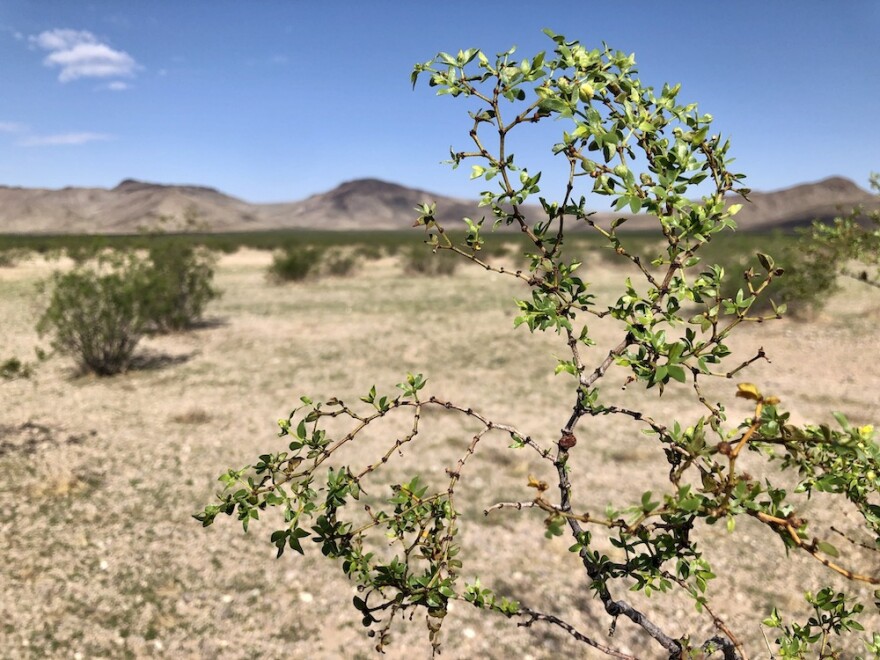The Hidden Valley south of Las Vegas is an open, dry stretch of desert scrub and craggy, beige mountains. It’s public land. For some, it might look like a landscape from the movie Dune. But Kyle Roerink, executive director of the Great Basin Water Network, sees it as part of an iconic, and fragile, ecosystem.
“We are looking out at a beautiful tract of the Mojave Desert,” he says.
Roerink says it's vital that this swath of land is protected. It's adjacent to the Sloan Canyon National Conservation Area and home to threatened species.
“We’re standing in primo desert tortoise habitat,” he says.
But if Nevada lawmakers get their way, most of this wide, wild valley overseen by the Bureau of Land Management could transform into a massive subdivision about 20 miles south of the Las Vegas strip.
“What we’re looking out at right now would be bulldozed for thousands and thousands of homes, shopping malls and all that stuff that’s associated with urban sprawl,” Roerink says.
As the affordable housing crisis deepens, this corner of the West is considering a controversial solution: selling off some public lands to build more homes. Las Vegas has seen home prices jump more than 20% over the past year, among the sharpest increases in the country.
“In Las Vegas, we are running out of available and affordable land,” says Christine Hess, executive director of the Nevada Housing Coalition. “What’s happening is prices are going up and it’s becoming even more out of reach for hard-working people in Nevada.”
That’s why she supports legislation introduced in Congress earlier this year that would allow the federal government to sell roughly 30,000 acres of public lands outside the city to developers. The goal is to build more affordable housing for Nevadans making 120% or less of the median income. The development could include manufactured homes and there are restrictions on water usage, according to Hess.
“Affordable home ownership is the way we build wealth in this country,” she says. “It’s the way we are able to increase our ability for economic mobility.”
She thinks selling off some public lands could be a way for other cities around the West to help meet the demand for housing as prices soar.
“I think this could be a model considered,” she says. “But it’s a big question and one that needs to bring a lot of stakeholders to the table to participate and to know if it’s the right choice for their community.”
For far-right anti-government activist Ammon Bundy, it’s absolutely the right choice. Bundy is best known for taking over the Malheur Wildlife Refuge in Oregon in 2016, but now he’s running a long-shot campaign for governor of Idaho. One of his platforms is selling off public lands to build affordable housing.
“We can either build up or we can build out,” he told supporters at a campaign event in July. “This crisis is simply a supply and demand issue. To create affordable housing for the young and old alike, we simply need more supply. And to have more supply we need to take our lands back.”
But the idea of selling off tracts of public lands, large or small, is sacrilegious in many parts of the West, and keeping them public is one of the few issues that still unites Democrats and moderate Republicans. Advocates argue these lands belong to every American, not just the people who live nearby.
“It doesn’t matter who your parents are, it doesn’t matter how much money you made last year, it doesn’t matter who you know — we all have equal footing,” says Land Tawney, president of the conservation nonprofit Backcountry Hunters and Anglers.
And public lands are the cornerstone of the West’s growing outdoor recreation economy, which accounts for more than 3% of Nevada's GDP, according to federal data.
But Nevada Sen. Catherine Cortez Masto, a Democrat, believes the housing situation in Las Vegas warrants a small, carefully structured sell-off. She introduced the bill, called the Southern Nevada Economic Development and Conservation Act. She says it makes sense in Nevada because the state has so much public land.
“Over 80% of the land is owned by the federal government,” she says. “That is unique” — more than any other state in the West.
Cortez Masto bristles at being compared to an extremist like Ammon Bundy. Her legislation would also designate 1.3 million acres of wilderness in the Desert National Wildlife Refuge north of the city, and expand the Red Rock Canyon National Conservation Area west of town.
She adds that Nevada lawmakers have actually been passing bills selling off public lands since the 1990s in an effort to help towns like Las Vegas grow. For example, previous legislation gave the city of Mesquite, Nev., the option of buying about 12,000 acres of public land. Other bills gave Clark County the option of buying federal lands near Las Vegas. Cortez Masto scoffs at the argument that the federal government should keep control of all that public land in her state.
“If that was the case, our Vegas valley and all our other communities would not have grown,” she says. “There would be no economic development. There would be no housing.”
Back in Hidden Valley south of Las Vegas, Roerink says Cortez Masto's bill has a chance because of the area's unique local culture.
“There is a recreation community here but because you also have something like the Las Vegas strip in your backyard, that often overshadows all these amazing wonders that we have surrounding us,” he says.
This story was produced by the Mountain West News Bureau, a collaboration between Wyoming Public Media, Nevada Public Radio, Boise State Public Radio in Idaho, KUNR in Nevada, the O'Connor Center for the Rocky Mountain West in Montana, KUNC in Colorado, KUNM in New Mexico, with support from affiliate stations across the region. Funding for the Mountain West News Bureau is provided in part by the Corporation for Public Broadcasting.
Copyright 2021 Boise State Public Radio News. To see more, visit Boise State Public Radio News.



